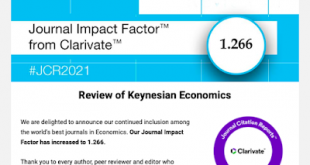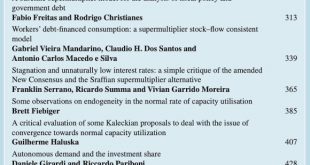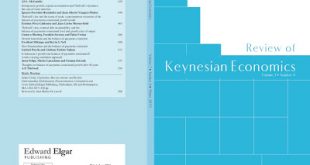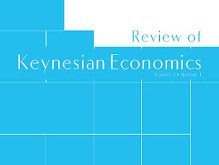The Review of Keynesian Economics (ROKE) Clarivate impact factor has gone up again. The five year one is a bit higher at 1.397. For a critical discussion of the role of impact factors and journal rankings see this old post from when ROKE was just 3 years old and was ranked for the first time. Next year it will be the 10th anniversary of the journal.
Read More »10 Years of Naked Keynesianism
A day like today back in 2011. First post here. I was at the University of Utah back then, and blogging had been going for a while, but nothing that was close to the kind of heterodox economics that mattered to me. Also, the Review of Keynesian Economics (ROKE) did not exist yet. More than 2000 posts and 4 million visits later the blog has certainly passed its peak. Interestingly enough the post with more visits is about Venezuela, but the second is less of a surprise, the one on the capital...
Read More »60 Years of Sraffa’s PCMC: Watch the whole seminar here
Ed Nell, who shared his signed copy of PCMC The whole Zoominar can be watched at the Review of Keynesian Economics' (ROKE) Facebook page here. It starts early with the live-stream, you can jump to minute 49 or so and watch from the onward.
Read More »Autonomous demand, capacity utilization, and the supermultiplier
New issue of ROKE is out. Check out the free papers by Serrano, Summa and Garrido Moreira, and by Fiebiger, beyond the intro by Summa and Freitas.
Read More »New issue of ROKE is out
The April Issue of the Review of Keynesian Economics is now out. The issue contains a collection of articles covering a spectrum of important issues. It opens with a debate over New Developmentalism which pits development relying on macro prices (especially the exchange rate) against historical state-led development policies. Next, there is an article on the role of the wage share in determining exchange rates. Thereafter, there are several articles on Post Keynesian growth theory. One...
Read More »Thirlwall’s law at 40
Table of contents of the next issue of the Review of Keynesian EconomicsThirlwall’s law at 40 Esteban Pérez Caldentey and Matías VernengoWhy Thirlwall’s law is not a tautology: more on the debate over the law J.S.L. McCombie Endogenous growth, capital accumulation and Thirlwall’s dynamics: the case of Latin America Ignacio Perrotini-Hernández and Juan Alberto Vázquez-MuñozThirlwall’s law and the terms of trade: a parsimonious extension of the balance-of-payments-constrained growth...
Read More »Forty Years of Balance of Payments Constrained Growth and Thirlwall’s Law
From original draft by Thirlwall Thirlwall's seminal paper on the balance of payments (BOP) constrained growth is forty years old. Paul Davidson once referred to the BOP constrained growth as a positive Post Keynesian contribution to economics. The Review of Keynesian Economics (ROKE) will publish soon a special issue with many well-known contributors to the literature, and with a paper by Thirlwall himself.The idea built on the Kaldorian supermultiplier model (Kaldor mark II), and with...
Read More »Review of Keynesian Economics on the economics of negative interest rates
We are delighted to announce the publication of Volume 7, Issue 2 of the Review of Keynesian Economics. We invite you to visit the website where you can read all the article abstracts and download two free articles.Over the last several years economic recovery has led to some monetary tightening in the United States, but it is likely that a future recession will restore the issue of negative interest rates to the fore of policy debate. That is also true for Europe where there has been a...
Read More »Heterodox Journals and Impact Factors
I blogged about journal rankings a while ago. As I said back then, journal rankings matter in decisions about grants and academic promotions, and there are biases against heterodox journals. So even if there are many problems with those measures (read previous post), they are still relevant. The Review of Keynesian Economics (ROKE), founded by Tom Palley, Louis-Philippe Rochon (now at ROPE) and myself, has now an impact factor of 0.738 in last year’s Clarivate Report (Thomson-Reuters...
Read More »Income distribution and the balance of payments: a formal reconstruction of some Argentinian structuralist contributions
A two part paper by Ariel Dvoskin and Germán David Feldman. From the abstract:In this two-part paper, we explore the interaction between income distribution and the balance of payments, by assessing the contributions of three Argentinian exponents of the Latin American Structuralist School: Oscar Braun, Marcelo Diamand and Adolfo Canitrot. With this aim, we introduce a two-sector model inspired by the classical tradition. Part I of the article examines the implications for prices and...
Read More » Heterodox
Heterodox









